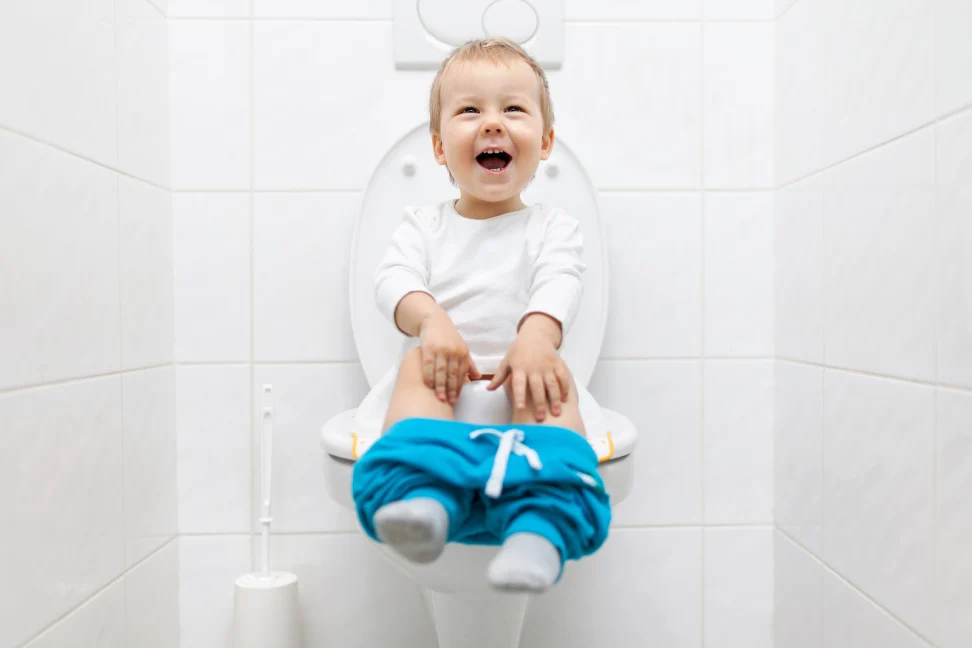Potty training is a significant milestone in a child’s development. It signifies a move towards independence and self-care. However, it’s not always a smooth journey. Many parents face resistance from their little ones, which can make the process frustrating and challenging. How to overcome resistance to potty training? In this article, we will delve into the common reasons for potty training resistance and provide you with practical strategies to help your child embrace this exciting transition.
Understanding Resistance
Resistance to potty training can manifest in various ways:
Refusal to sit on the potty
Your child might express outright refusal to even try sitting on the potty, often accompanied by tantrums or tears.
Holding it in
Some children might hold their bowel movements or urine for extended periods, leading to discomfort and potential health concerns.
Accidents after initial success
Your child might regress and have accidents even after showing initial progress in potty training.
Common Reasons for Resistance
Understanding the root cause of resistance is key to addressing it effectively. Here are some common reasons why children might resist potty training:
- Fear and Anxiety: The potty can be intimidating for young children. They may fear falling in, flushing, or the unfamiliar sensation of using the toilet.
- Control and Independence: Potty training involves relinquishing some control over bodily functions, which can be challenging for toddlers who are asserting their independence.
- Lack of Readiness: Some children may simply not be developmentally ready for potty training, even if they are within the typical age range.
- Negative Experiences: A previous negative experience, such as forceful training or shaming for accidents, can create anxiety and resistance.
- Underlying Medical Issues: In some cases, underlying medical issues like constipation or urinary tract infections can contribute to resistance. If you suspect a medical problem, consult your child’s pediatrician.
Strategies for Overcoming Resistance
- Create a Positive and Supportive Environment: Make potty training a fun and positive experience. Decorate the bathroom with your child’s favorite characters, read potty-themed books, and sing songs.
- Offer Choices: Give your child some control over the process by offering choices, such as which potty to use or which underwear to wear.
- Use Positive Reinforcement: Celebrate every small success with lots of praise and encouragement. Avoid punishment or shaming for accidents, as this can create anxiety and hinder progress.
- Make it a Game: Turn potty training into a game with rewards and incentives. Stickers, small toys, or special outings can motivate your child to participate.
- Be Patient and Consistent: Potty training takes time and consistency. Stick to a routine, offer frequent reminders, and be patient with your child’s progress.
- Address Fears and Anxieties: If your child expresses fear or anxiety about the potty, address their concerns with empathy and reassurance. Let them explore the potty at their own pace and offer comfort and support.

Additional Tips
- Timing is Key: Start potty training when your child shows signs of readiness, such as staying dry for longer periods, expressing interest in the potty, or pulling their diaper off.
- Don’t Rush: Avoid rushing the process or comparing your child to others. Every child develops at their own pace.
- Make it Convenient: Ensure the potty is easily accessible and comfortable for your child to use. Consider using a potty seat or step stool for added convenience.
- Stay Positive: Maintain a positive and encouraging attitude throughout the process. Your child will pick up on your cues and feel more confident and motivated.
Overcoming resistance to potty training requires patience, understanding, and a positive approach. By creating a supportive environment, addressing your child’s concerns, and celebrating their successes, you can help them embrace this important milestone with confidence and ease. Remember, every child is different, and the journey to potty training independence may vary. Trust your instincts, listen to your child, and enjoy this exciting phase of their development.
Overcoming Specific Challenges: Targeted Solutions
Sometimes, resistance to potty training manifests in specific behaviors or challenges. Here are some targeted solutions to help you navigate them:
- Fear of Flushing: If the flushing sound scares your child, try flushing after they’ve left the bathroom or allow them to control the flush themselves once they feel comfortable.
- Discomfort with Public Restrooms: Practice using public restrooms beforehand, and carry a portable potty seat for added familiarity and comfort.
- Regression: If your child experiences setbacks or accidents after initial success, don’t panic. Offer gentle reminders, reinforce positive behavior, and avoid showing frustration.
When to Seek Professional Help
While most instances of potty training resistance can be managed at home with patience and consistent strategies, sometimes seeking professional guidance can be beneficial. Consider consulting your child’s pediatrician or a qualified potty training specialist if:
- Your child is consistently resistant despite your efforts.
- Your child experiences significant anxiety or distress related to potty training.
- You suspect underlying medical issues that might be contributing to the resistance.
- You feel overwhelmed or unsure about how to proceed.
The Role of Patience and Understanding
Potty training is a journey, not a race. It’s crucial to approach it with patience, understanding, and empathy. Remember, every child is unique, and their readiness for potty training will vary.
- Avoid Comparisons: Comparing your child’s progress to others can create unnecessary pressure and frustration.
- Celebrate Small Wins: Acknowledge and celebrate even the smallest successes, such as sitting on the potty, flushing, or washing their hands.
- Focus on the Long Term: Remember that the ultimate goal is to help your child achieve independent toileting skills. Focus on the long-term benefits rather than short-term setbacks.
Beyond the Bathroom: Fostering Independence in Other Areas
While potty training is a major step towards independence, it’s also an opportunity to foster self-reliance in other areas of your child’s life. Encourage them to participate in age-appropriate tasks, such as:
- Dressing themselves: Start with simple clothing items like loose-fitting pants and shirts.
- Washing their hands: Teach them the importance of handwashing and guide them through the steps.
- Brushing their teeth: Let them practice brushing their teeth with supervision and assistance.
- Putting away toys: Encourage them to help clean up after playtime and put their toys away in designated bins or shelves.
By fostering independence in these everyday activities, you’ll not only boost your child’s confidence but also make the potty training process smoother, as they’ll be more receptive to taking ownership of their bodily functions.
Potty Training Resources
Numerous resources are available to support you and your child during the potty training journey:
- Books and Videos: Potty-themed books and videos can introduce the concept of toilet training in a fun and engaging way.
- Potty Training Apps: Interactive apps can help track your child’s progress and offer rewards and incentives.
- Parent Support Groups: Connect with other parents who are going through the same experience. Share tips, challenges, and successes to gain valuable insights and support.
- Pediatrician or Specialist: If you encounter significant challenges or concerns, don’t hesitate to seek professional guidance from your child’s pediatrician or a potty training specialist.

Conclusion: Embracing the Journey
Potty training is a significant milestone in your child’s development, and overcoming resistance requires patience, understanding, and a positive approach.
By creating a supportive environment, addressing your child’s fears and anxieties, and celebrating their progress, you can help them embrace this transition with confidence and ease.
Remember, the journey to potty training independence may have its challenges, but with consistency, love, and a little bit of humor, you can navigate this exciting phase successfully.






